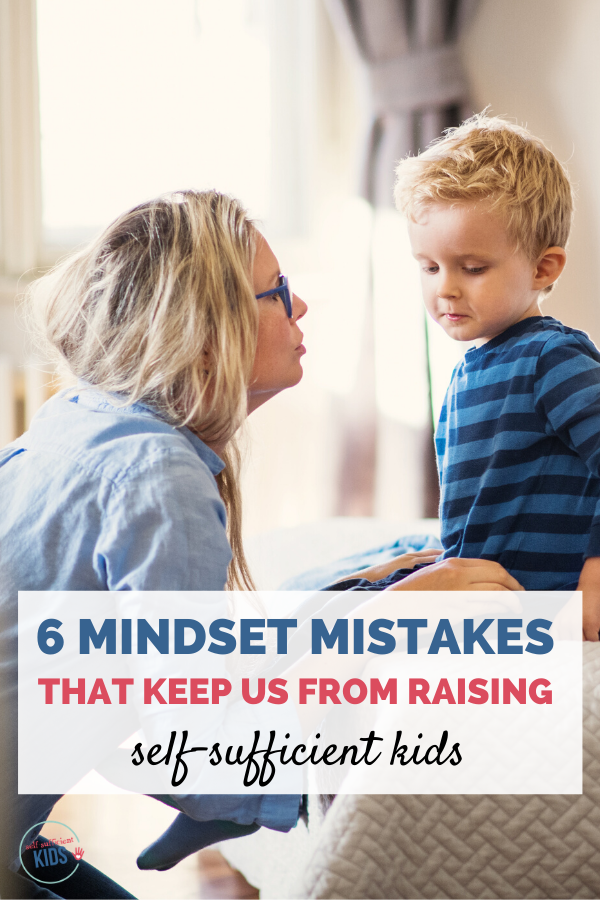6 Parenting Mindsets That Keep Us From Raising Self-Sufficient Kids
Without realizing it, many well-intentioned parents develop mindsets that hinder their children’s growth towards a successful, self-sufficient adulthood.

(This post contains affiliate links. If you click on a link and make a purchase, I’ll receive a commission at no extra cost to you.)
Our children will leave the nest one day.
Whether we want them to or not.
And when that time comes, most parents hope their children will be prepared to enter the world with the confidence, knowledge, and ability to act independently and be self-sufficient.
Research shows that parents can play a vital role in just how self-sufficient their kids will be as adults. Teaching life skills, supporting kids academically, and through social and emotional challenges are good places to start.
But even after committing to take on these endeavors, the most well-intentioned parents may, without realizing it, have adopted certain mindsets that can actually hinder kids’ growth towards self-sufficiency.
6 Mindset Mistakes That Keep Parents From Raising Self-Sufficient Kids
The six mindset mistakes listed below can sneak up on us if we’re not careful and cause us to parent in ways we don’t intend, hindering their growth towards self-sufficiency.
Parenting out of fear
Parenthood is perhaps the greatest responsibility most adults will experience in their lifetime. After all, the well-being of another human being is on our shoulders. Our children depend on us for just about everything: shelter, food, clothing, love, support, and guidance into a successful adulthood.
So it’s not surprising that all parents experience fear at some point along this journey. Part of that fear is good – it keeps our kids out of harm when they might otherwise experience physical injury or worse. But some parental fear can hinder children from developing the very skills they’ll need to fend for themselves as adults.
For example, some parents are so fearful of their children’s future that they make decisions for them. They feel that as parents they have a better sense of which classes and activities will lead their children to success. They may even determine smaller details of their child’s life such as what they should wear or how they should spend their free time.
But controlling a child’s life to this extent stunts kids’ ability to make decisions and problem-solve independently. It also sends the message to children that they aren’t capable of making decisions independently which can lead to lower self-esteem.
Shielding children from anxiety, failure, and disappointment
It’s never easy for a parent to see their child experience anxiety, failure and disappointment. But shielding children from a set-back robs kids of the chance to develop the emotional muscle they need to deal with failure and disappointment in the future.
Parents should always show empathy when kids experience these situations and emotions. But instead of shielding children, parents can serve as a coach to help their kids learn how to handle them.
For a child experiencing anxiety, experts suggest what’s called progressive desensitization, or the process of gradually letting the child experience whatever is provoking anxiety. The more a child is able to handle or at least learn how to deal with an anxiety, the more confidence he will gain in dealing with greater anxieties as he moves into adulthood.
When children experience failure, parents can work to reframe that failure into an opportunity for learning and growth (known as developing a growth mindset). Children can also benefit from hearing parents talk about their own setbacks or failures to let kids see that failure is a normal part of life and not something to be feared.
Every adult experiences failure at some point. Being able to know how to handle failure in a positive way that inspires perseverance and determination serves children better than having a manufactured spotless record of successes.
Not setting boundaries or limits for children
While completely controlling a child’s life can be detrimental, going to the other extreme of letting kids do whatever they want, can also have negative consequences.
As children grow and mature they need parents and other important adults in their life to help them learn and understand appropriate ways to behave. Without this guidance, children could find themselves feeling socially lost, and without self-discipline to accomplish small tasks and larger goals. Worse, if parents give into their child’s every whim the child may expect others to do the same which isn’t the way the real world works.
Parents sometimes avoid setting limits because it’s easier to mollify a child than deal with a tantrum. Or they may fear that their child won’t like them if they won’t let them do what they want. Other parents simply lack the self-confidence to be a leader and hold firm (with respect and empathy) to the limits they know their children need.
But the truth is, no matter how much a child complains or gets angry about the boundaries their parents set, deep down they actually want these guideposts in life. Boundaries and limits help children feel a greater sense of security, which reduces their anxiety. And demonstrating the proper way to behave lets kids build strong relationships outside of the family as well as have the discipline to get what they need to get done each day to be successful.

Letting children avoid responsibility
When asked, parents acknowledge that they want to raise their children to be responsible. But unfortunately, many parents today let their children avoid responsibility. Some parents do this because they just want to “let their kids be kids,” whereas others are so focused on their child’s competitive advantage in life that they take over responsibilities for their children — such as by driving forgotten sports gear or homework to school or accusing teachers and coaches of being unfair when grades or decisions make their children look bad.
Children who learn responsibility understand the importance of pitching in and working side-by-side with others on a task. They also obtain skills to better understand how to organize and complete a task. But any child that isn’t given the chance to practice and demonstrate responsibility in childhood isn’t likely to demonstrate it in adulthood.
Parents can help instill a sense of responsibility in their kids by having their children help out around the home, often by doing chores. They can also coach their kids to manage their time and belongings independently. Kids will make mistakes along the way as they take on greater responsibility, which will require parents’ patience. But kids learn important lessons from mistakes, and it’s better for them to learn those lessons now than in adulthood.
Are you wondering when your child can begin doing certain tasks and chores on their own? Click here to sign up for my weekly emails and you’ll receive my Age-Appropriate Guide to Kids’ Independence as a free gift.
Comparing children with other children
It can be so tempting to determine how our children are faring by comparing them to other kids. Parents may find themselves looking for markers of their children’s success by questioning if their child is reading at the same rate as other children, is advanced enough in math, if they’re getting the same play time in a sport, and ultimately, which college or university their child is accepted to.
While no parent should ignore what appear to be developmental delays, constantly comparing our kids to other children can be counterproductive. No child (or adult) follows the same path to success. It’s more common for success to happen in a squiggly line rather than a straight-and-narrow path (as illustrated by Madeline Levine in her book Ready or Not).
Believing that our child needs to do the same activities, attain the same milestones on the same schedule as other children can lead parents to push their children into activities they don’t enjoy and into classes that are not a good fit. This ultimately dwindles their child’s self-esteem as they sense that their parents feel they’re not good enough.
Trying to be a perfect parent who raises perfect children
The responsibility of parenthood can feel overwhelming. Some parents respond to this by trying to do everything “right,” including never showing sad or angry emotions and giving kids everything they could possibly need (or oftentimes simply want) to attain a narrow definition of success.
An extension of this desire to be a perfect parent is attempting to raise “perfect” kids. When this happens, parents view kids subconsciously as a reflection of the their own successes or failures. With this mindset, there’s no room for setbacks or lack of achievement. Parents who feel that they need to raise perfect children often push their children in ways that are unnatural or uncomfortable for their kids. The result is that these kids have little time or space to determine for themselves who they are and what they want to be.
Furthermore, any parent that tries to be perfect, isn’t modeling the resiliency that their children will need when they become adults. Having been shielded from their parent’s flaws, children may look at their own flaws as tragedies which could lead to low self-esteem and possibly depression. As this article puts it: “The Good-Enough Parent is the Best Parent”.
Recognition is the first step
Being a parent is no easy task and in the society we live in these mindsets can creep into our thinking without us being aware of it. It may take diligence and practice to change them, but recognition is the first step. The more we’re able to purge these mindsets, the more our kids will benefit as they’re given the trust and freedom to grow into the self-sufficient adults we want them to be.
Related posts:
Why Positive Parenting is Essential for Raising Self-Sufficient Kids
10 Parenting Practices That Pay Big Dividends When Kids Are Older
What Kids REALLY Need to Be Confident, Independent, and Self-Reliant
What to do next…
1. Subscribe to Self-Sufficient Kids’ email list.
Like what you read here and want to learn more? Every Thursday I’ll send you one parenting tip about raising self-sufficient kids and creating the peaceful relationship you yearn to have with your child. Click here to sign up.
2. Take one of my quizzes!
Find out if you’re raising a self-sufficient kid (click here) or if you’re doing too much for your kids (click here). At the end of each quiz, you’ll be asked to provide your email address to see the results.
3. Get your kids started on chores.
Learn how to get your child started on chores (& keep them motivated + avoid power struggles) by enrolling in my Get Your Kids Successfully Started on Chores course. Click here to learn more and sign up.

About Kerry Flatley
Hi! I’m Kerry, the mother of two girls and a certified parent educator. I believe it is possible for parents to have a supportive, loving, and warm relationship with their kids while raising them to be independent and ultimately self-sufficient. Over the years, I’ve read numerous books and articles that support this belief and I’ve put these ideas into practice with my own kids. Read more about me and Self-Sufficient Kids here.


